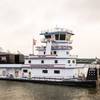The first phases of a USCG final rule implementing measures for maintaining or regaining control of a tank barge that will reduce the likelihood of a tank barge's grounding and spilling its cargo are effective June 19, 2000. These measures are necessary, according to USCG because without them a tug that loses its tow lacks ready means for regaining control of it. The rule is designed to increase the safety of marine transport and protect the environment.
On January 19, 1996, the tugboat Scandia, towing the oil barge North Cape, caught fire five miles off the coast of Rhode Island. The crew could not control the fire, and without power they were unable to prevent the barge, carrying four million gallons of oil, from grounding and spilling about a quarter of its contents into the coastal waters. The North Cape spill led Congress to add, in section 901 of the 1996 Coast Guard Authorization Act (Pub. L. 104-324), a new statute, 46 U.S.C. 3719. It directs the Secretary of Transportation to issue rules necessary to reduce oil spills from single-hull non-self-propelled tank vessels. On October 6, 1997, we published a notice of proposed rulemaking (NPRM) on safety of towing vessels and tank barges (62 FR 52057). With the interim rule we published on December 30, 1998 (63 FR 71754), we adjusted safety measures proposed in the NPRM. With this final rule, instead of requiring just one emergency control measure, we are requiring an anchoring system (on single-hull tank barges) plus one other (backup) measure.
Subscribe for
Maritime Reporter E-News
Maritime Reporter E-News is the maritime industry's largest circulation and most authoritative ENews Service, delivered to your Email five times per week









